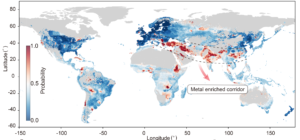Retailers are preparing for a surge in sales during Black Friday weekend, with big discounts online and in-store. Christian McBride – Founder and CEO of Genuine Solutions, a technology recycling firm fighting against e-waste.
Here he considers the environmental impact of the annual sales event.
Black Friday and Cyber Monday have become popular sales events for British shoppers in recent years, with consumers expected to spend £7bn this year on November 29 and December 1 respectively. The concept of Black Friday – offering a small window of opportunity to buy goods with significant discounts – encourages shoppers to make impulse buys. Although this is great for sales, returns also increase around this time, as people decide they regret their purchases. In 2018, the cost of these returns to UK retailers was put at £362m.
As technology evolves, consumers continue to want the latest products, causing former generations of devices to become outdated. People often throw their old phones and accessories away, which end up in the typical waste stream – 1.4 million tonnes of electronic waste are sent to landfill every year in the UK, leaking harmful toxins into the earth. Given the rising awareness of sustainability amongst consumers (72%of millennials are willing to pay more for sustainable goods) Black Friday is an issue many tech retailers will want to focus on, for both environmental and economic reasons.
Retailers’ profits can be severely impacted by Black Friday returns – affecting their margins during a peak shopping period. However, the problem is two-fold for retailers of consumer technology products such as smartphones, tablets, laptops and TVs: such items are not as easy to recondition and get back into stock, particularly if they are faulty. Businesses can find themselves left with stock they are unable to resell. Not only does this mean there is value going to waste, but it creates a sustainability issue.
Retailers need to find new sustainable solutions for the recovery and redistribution of returned consumer technology goods. Recycling facilities are increasingly working with retailers to find environmentally friendly ways of dealing with redundant technology products.
Rather than ending up in landfill, they work to breathe new life into accessories and devices. Equally important for retailers, these recycled products can be sold again, providing new revenue opportunities and extending the product’s life cycle in an ethical and sustainable way.
By creating a circular economy, e-waste is significantly reduced and valuable resources are not wasted. Even smartphones that cannot be repaired are valuable. They contain precious metals such as platinum, gold and silver. Phone batteries contain nickel which can be made into stainless steel for saucepans and the plastics can be melted down and made into sheeting or traffic cones.
When simply thrown away, these resources are lost, requiring ongoing mining and drilling for new precious metals – of which the Earth only has a finite amount. According to a new study by the Royal Society of Chemistry, some of these precious metals are expected to run out in the next 100 years if more sustainable alternatives are not found.
Almost every component of an electronic device can be reused. All of the components of a smartphone (such as camera modules, batteries, or even external buttons) can be repurposed – even if the device is smashed to pieces.
The OLED screen of an iPhone XS is worth almost £200. Even the sim tray has a value of approximately £1. Considering around 40 million gadgets are left unused in people’s home across the UK, that is a substantial waste of resources.
There is no doubt that Black Friday and Cyber Monday can help retailers’ profitability. The key now is to work towards a more sustainable approach to these big sales events, focusing on the recovery, reuse and resale of returned consumer tech goods. Doing so will benefit the environment massively while creating new revenue streams for retailers of all sizes.
This year, it is expected that Black Friday and Cyber Monday will break previous sales records. New mobile phones and electronic gadgets will continue to make up a large proportion of these sales, which will result in older handsets and accessories being left to gather dust or ending up in landfill polluting the environment.















